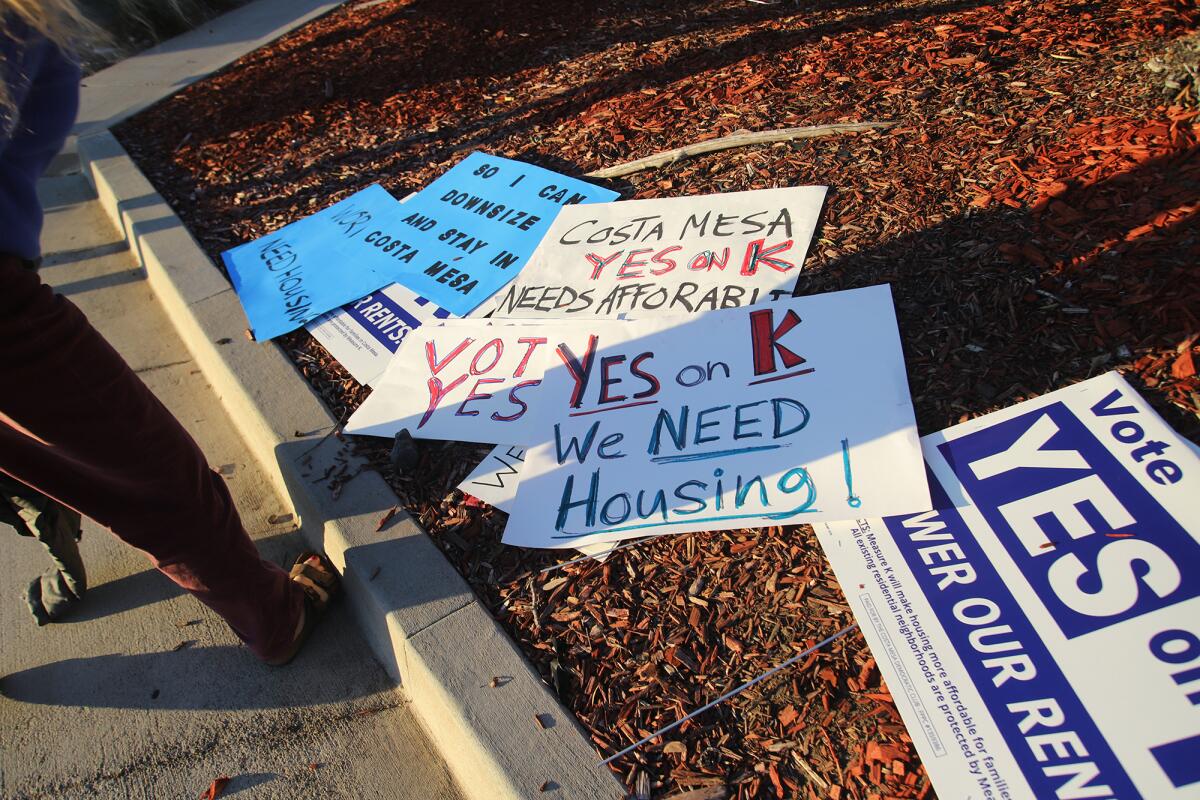Costa Mesa’s Measure K promised a public process for rezoning. Will it deliver?

- Share via
Costa Mesa officials this week approved a nearly $2-million contract with a planning and engineering firm to chart a course toward rezoning numerous commercial, industrial and opportunity sites throughout the city to allow for more housing.
Rezoning is a key element in delivering on a promise made in the city’s Measure K, a 2022 initiative that overrides an earlier referendum requiring certain large-scale developments or zone changes be put to a vote of the people.
It’s also necessary for Costa Mesa to certify its compliance with a state mandate requiring the city plan for the creation of 11,760 new residential units by 2029. Like Measure K, the roadmap outlining how that will be done — the housing element portion of the city’s general plan — came due in 2022.
Revising the city’s zoning codes and regulations is a daunting process estimated to take up to two years to complete. Yet, staffing shortages at City Hall, particularly in the city’s planning department, have created major delays.
Now, two years past the deadline and with the threat of punishment from the state looming, including allowing builders with state-compliant projects the right to bypass local laws, city leaders are in a race against time.
“There’s a reason why we have to move swiftly on this,” Mayor Pro Tem Manuel Chavez said in a City Council meeting Tuesday. “If we want to have a say in Costa Mesa about the kind of housing we build in the city, we have to take ownership of the fact that the longer we delay implementing this, the longer the risk comes into play.”
To fulfill a mandate that Costa Mesa accommodate 11,760 new residential units by 2029, leaders are surveying every possibility before an Oct. 15 deadline.
Council members Tuesday unanimously approved a three-year, $1,850,611 professional services agreement with San Diego County-based firm Dudek to oversee the rezoning process. The contract includes an additional 10% contingency and may be extended up to two, one-year terms.
Dudek planner Catherine Tang Saez assured the council her firm would help the city work swiftly and efficiently to meet its goals. The firm aims to prepare the housing element for final certification by November 2026.
“The sites have been selected, the densities have been set. There’s been an obligation made to the state, and our job as consultants is to help the city, to take you to the finish line,” she said.
But residents speaking in public comments urged the city not to run roughshod over the interests of community stakeholders in their haste to rezone the city, particularly when Measure K itself promised a public visioning process would take place.
Some expressed their desire for a citizens advisory committee that would inform consultants and city staff of residents’ wishes for certain streets and neighborhoods.
“Task force, task force, task force — this is so necessary to build community consensus on this major rezoning of the city,” said resident Richard Huffman. “We’ve delayed so long on getting around to doing any visioning and working on this rezoning that now there’s no time for it. This is just shameful.”
Mayor John Stephens expressed a concern there was no formal mention of how Dudek and city staff would engage community members in the rezoning process.
“It seems like somebody could criticize us and say we’ve skipped that visioning process that was part of Measure K,” he said.
Carrie Tai, the city’s economic and development services director, explained the visioning process was baked into Dudek’s proposal and promised the public would have multiple opportunities to weigh in throughout the two-year process.
“This absolutely encompasses the visioning process in a method that accommodates a schedule the city needs to deliver on,” Tai told the council.
Councilwoman Andrea Marr said she didn’t feel an advisory group was necessary, but urged city staff to do their best to engage a vast range of stakeholders in meaningful ways.
“There are more ways than just a task force to do visioning,” she said. “[But] I do want to make sure we’re doing effective community engagement, that we are asking people what their vision is. This is a huge opportunity to make sure we’re doing what the public wants.”
All the latest on Orange County from Orange County.
Get our free TimesOC newsletter.
You may occasionally receive promotional content from the Daily Pilot.





